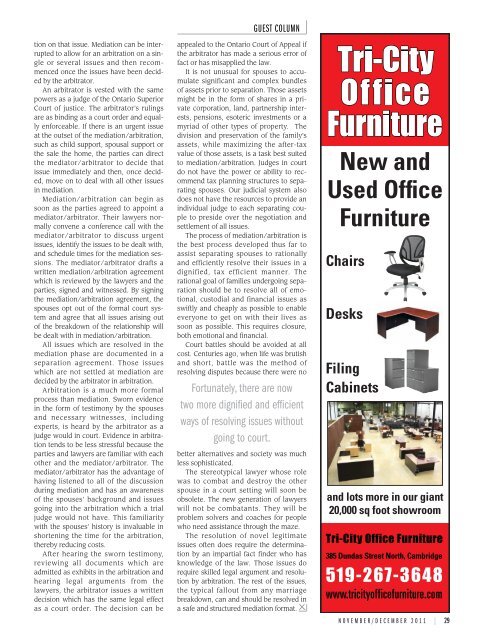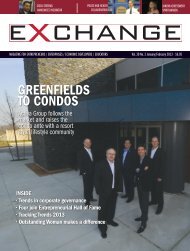PDF Download - Exchange Magazine
PDF Download - Exchange Magazine
PDF Download - Exchange Magazine
- No tags were found...
Create successful ePaper yourself
Turn your PDF publications into a flip-book with our unique Google optimized e-Paper software.
tion on that issue. Mediation can be interruptedto allow for an arbitration on a singleor several issues and then recommencedonce the issues have been decidedby the arbitrator.An arbitrator is vested with the samepowers as a judge of the Ontario SuperiorCourt of justice. The arbitrator’s rulingsare as binding as a court order and equallyenforceable. If there is an urgent issueat the outset of the mediation/arbitration,such as child support, spousal support orthe sale the home, the parties can directthe mediator/arbitrator to decide thatissue immediately and then, once decided,move on to deal with all other issuesin mediation.Mediation/arbitration can begin assoon as the parties agreed to appoint amediator/arbitrator. Their lawyers normallyconvene a conference call with themediator/arbitrator to discuss urgentissues, identify the issues to be dealt with,and schedule times for the mediation sessions.The mediator/arbitrator drafts awritten mediation/arbitration agreementwhich is reviewed by the lawyers and theparties, signed and witnessed. By signingthe mediation/arbitration agreement, thespouses opt out of the formal court systemand agree that all issues arising outof the breakdown of the relationship willbe dealt with in mediation/arbitration.All issues which are resolved in themediation phase are documented in aseparation agreement. Those issueswhich are not settled at mediation aredecided by the arbitrator in arbitration.Arbitration is a much more formalprocess than mediation. Sworn evidencein the form of testimony by the spousesand necessary witnesses, includingexperts, is heard by the arbitrator as ajudge would in court. Evidence in arbitrationtends to be less stressful because theparties and lawyers are familiar with eachother and the mediator/arbitrator. Themediator/arbitrator has the advantage ofhaving listened to all of the discussionduring mediation and has an awarenessof the spouses’ background and issuesgoing into the arbitration which a trialjudge would not have. This familiaritywith the spouses’ history is invaluable inshortening the time for the arbitration,thereby reducing costs.After hearing the sworn testimony,reviewing all documents which areadmitted as exhibits in the arbitration andhearing legal arguments from thelawyers, the arbitrator issues a writtendecision which has the same legal effectas a court order. The decision can beGUEST COLUMNappealed to the Ontario Court of Appeal ifthe arbitrator has made a serious error offact or has misapplied the law.It is not unusual for spouses to accumulatesignificant and complex bundlesof assets prior to separation. Those assetsmight be in the form of shares in a privatecorporation, land, partnership interests,pensions, esoteric investments or amyriad of other types of property. Thedivision and preservation of the family’sassets, while maximizing the after-taxvalue of those assets, is a task best suitedto mediation/arbitration. Judges in courtdo not have the power or ability to recommendtax planning structures to separatingspouses. Our judicial system alsodoes not have the resources to provide anindividual judge to each separating coupleto preside over the negotiation andsettlement of all issues.The process of mediation/arbitration isthe best process developed thus far toassist separating spouses to rationallyand efficiently resolve their issues in adignified, tax efficient manner. Therational goal of families undergoing separationshould be to resolve all of emotional,custodial and financial issues asswiftly and cheaply as possible to enableeveryone to get on with their lives assoon as possible. This requires closure,both emotional and financial.Court battles should be avoided at allcost. Centuries ago, when life was brutishand short, battle was the method ofresolving disputes because there were noFortunately, there are nowtwo more dignified and efficientways of resolving issues withoutgoing to court.better alternatives and society was muchless sophisticated.The stereotypical lawyer whose rolewas to combat and destroy the otherspouse in a court setting will soon beobsolete. The new generation of lawyerswill not be combatants. They will beproblem solvers and coaches for peoplewho need assistance through the maze.The resolution of novel legitimateissues often does require the determinationby an impartial fact finder who hasknowledge of the law. Those issues dorequire skilled legal argument and resolutionby arbitration. The rest of the issues,the typical fallout from any marriagebreakdown, can and should be resolved ina safe and structured mediation format. XNew andUsed OfficeFurnitureChairsDesksFilingCabinetsand lots more in our giant20,000 sq foot showroom385 Dundas Street North, Cambridgewww.tricityofficefurniture.comN O V E M B E R / D E C E M B E R 2 0 1 1 | 29
















